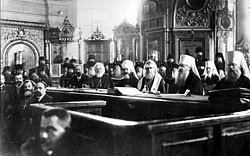Synod
The word synod also refers to the standing council of high-ranking bishops governing some of the autocephalous Eastern Orthodox churches.Similarly, the day-to-day governance of patriarchal and major archiepiscopal Eastern Catholic Churches is entrusted to a permanent synod.'assembly') is a formal gathering or council of bishops together with other clerical and lay delegates representing the church to deal with matters of faith, morality, rite, and canonical and cultural life.The presence of clerical and lay delegates is for the purpose of discerning the consensus of the church on important matters; however, the bishops form an upper house of the sobor, and the laity cannot overrule their decisions.[citation needed] Kievan Rus' chronicles record the first known East Slavic church sobor as having taken place in Kiev in 1051.Sobors were convened periodically from then on; one notable assembly held in 1415 formed a separate metropoly for the church in the Grand Duchy of Lithuanian lands.Modern Catholic synod themes: Meetings of bishops in the Roman empire are known from the mid-third century and already numbered twenty by the time of the First Council of Nicaea (325).[5] Today, Council in Roman Catholic canon law typically refers to an irregular meeting of the entire episcopate of a nation, region, or the world for the purpose of legislation with binding force.The convoking authority can also select other members of the faithful (including the laity) to participate in the council in an advisory capacity.In the Presbyterian system of church governance the synod is a level of administration between the local presbytery and the national general assembly.



Orbital periodPaxos (computer science)KrakówPiotr GembickiChristianityChristNativityBaptismMinistryCrucifixionResurrectionAscensionOld TestamentNew TestamentGospelChurchNew CovenantTheologyTrinityFatherHoly SpiritApologeticsChristologyHistory of theologyMissionSalvationUniversalismHistoryTraditionApostlesEarly ChristianityChurch FathersConstantineCouncilsAugustineIgnatiusEast–West SchismCrusadesAquinasReformationLutherDenominations(full list)NiceneCatholicEasternOld CatholicPalmarian CatholicIndependent CatholicSedevacantismEastern OrthodoxOriental OrthodoxChurch of the EastProtestantAdventistAnabaptistAnglicanBaptistFree EvangelicalLutheranMethodistMoravian [Hussite]PentecostalPlymouth BrethrenQuakerReformedUnited ProtestantWaldensianNondenominational ChristianityRestorationistChristadelphiansIglesia ni CristoIrvingiansJehovah's WitnessesLatter Day SaintsMembers Church of God InternationalThe Church of Jesus Christ of Latter-day SaintsThe New Church (Swedenborgian)Unitarians and UniversalistsCivilizationCriticismCultureEcumenismGlossaryLiturgyOther religionsPrayerSermonSymbolismWorshipOutlineChristian denominationAncient GreekbishopsCatholicismOriental OrthodoxyEastern Orthodoxyecumenical councilautocephalouspatriarchalmajor archiepiscopalEastern Catholic ChurchesSaint TikhonPatriarch of Moscowsynods of bishopsChurch SlavonicclericalEastern Orthodox ChurchesSlavic languagesRussianUkrainianBulgarianSerbianMacedonian Orthodox ChurchesRomanian Orthodox Churchupper houseKievan Rus'metropolyGrand Duchy of Lithuanianhistory of the Russian Orthodox ChurchVladimir's SoborStoglavy SoborSobor of a Hundred ChaptersMoscow Sobor of 1666–1667Patriarch NikonMoscow Patriarchate